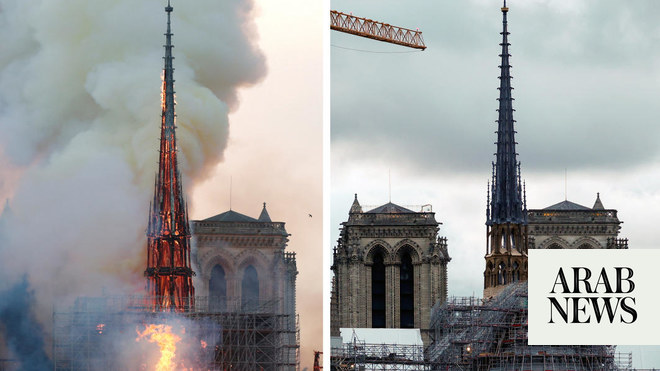
French leaders have frequently used attempts at destroying Paris by fire to unify their divided country. Charles de Gaulle, France’s best-known modern leader, famously entered the capital city following four years of Nazi occupation and told ecstatic crowds of fellow citizens: “Paris outraged. Paris broken. Paris martyred. But Paris liberated.”
That De Gaulle’s August 1944 address took place just across the River Seine from Notre-Dame Cathedral was highly significant. German soldiers had poured gunfire into the ancient place of worship, which — as other national treasures — had been earmarked for destruction by Adolf Hitler himself. Explosives would be ignited at key sites, creating uncontrollable infernos, but the plot failed.
The drama was depicted in “Is Paris Burning?” the epic war movie starring Orson Welles, Kirk Douglas and Jean-Paul Belmondo. It came out in 1966, by which time De Gaulle was not only president, but the founder of the current Fifth Republic.
Now it is Emmanuel Macron’s turn to try and benefit from a disaster that could have ended with Notre-Dame being erased from history. There were certainly moments on that night two weeks ago when many of us who were born and brought up in Paris joined millions of others around the world in fearing the worst. The cataclysmic fire broke out around rooftop scaffolding, ravaging much of the medieval building’s interior, along with its spire.
Macron was soon on live national television, insisting that the whole of France should be focused on restoring Notre-Dame. More than 1 billion euros have already been pledged to his appeal. The biggest donors are, inevitably, tycoons whom Macron — the so-called “President of the Rich” — is particularly close to. This has angered some, who think that Macron’s friends in big business are simply virtue signaling and using high-profile philanthropy to show off their brands, such as L’Oreal and the luxury goods group LVMH.
Under French law, individuals such as Bernard Arnault, France’s richest man, can deduct 66 percent of a charitable gift off their taxes, while companies can claim back 60 percent. Beyond the huge cost to the public purse, critics argue that such enormous amounts of cash would be better spent on helping the poor and the sick, as the teachings of the Catholic Church suggest.
Foremost among these dissenters are the “Gilets Jaunes” — the Yellow Vests social movement calling for the reform of what they see as a profoundly unequal France. Protesters wearing their trademark high-visibility roadside jackets have rampaged through towns and major cities every Saturday since last November, and they remain the biggest challenge to Macron since he came to power two years ago. Fire has continually proved to be a powerful weapon in the Yellow Vests’ armory. Over recent weekends, they have been responsible for blazes next to world-famous public monuments, ranging from the Eiffel Tower and Arc de Triomphe to the Jeu de Paume art gallery. More seriously still, they have actually burned banks and apartment blocks out, causing mass panic and risking grave injuries to those caught up in the arson.
Astonishingly, the Yellow Vests were back with their matches and lighter fuel within a week of the Notre-Dame conflagration, setting improvised barricades alight on Paris’ Right Bank. Some of their fires burned just across the Seine from the cathedral, which is now guarded night and day because of fears that it will be targeted.
The reaction has been shock and anger. Opposition leaders, including Jean-Luc Melenchon on the far left and Laurent Wauquiez of the right-wing Republicans, have practically declared a truce on political arguments over Notre-Dame, agreeing with Macron that everybody needs to work together to protect it and other symbols of France.
“We can do it,” the president said in his TV address, guaranteeing Notre-Dame will be rebuilt “even more beautifully” within five years, adding: “It’s up to us to convert this disaster into an opportunity to come together.”
Gen. De Gaulle may have been a wartime hero but, like Macron, he went through periods of immense unpopularity and violent dissent. The rioters who pushed for revolution in De Gaulle’s France in May 1968 shared the same kind of sense of injustice as the Yellow Vests.
Like De Gaulle before him, Macron is a pragmatic politician who will use any means possible to portray himself as a unity leader. His popularity rating remains stuck below 30 percent, and success in the upcoming European Parliament elections is by no means assured.
As history has shown, there are few better ways of reversing such a feeling of uncertainty than responding defiantly to existential threats.
Macron is emerging as a determinedly predictable French president — one who knows exactly how to turn potential tragedies to his own advantage.












